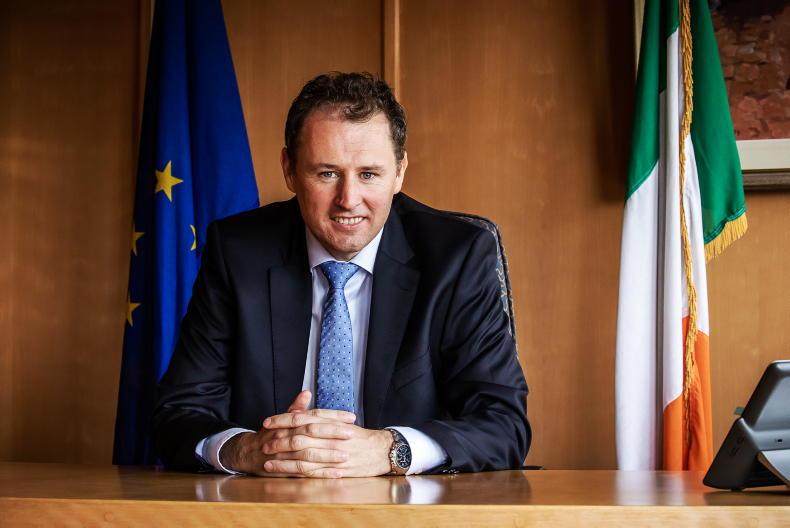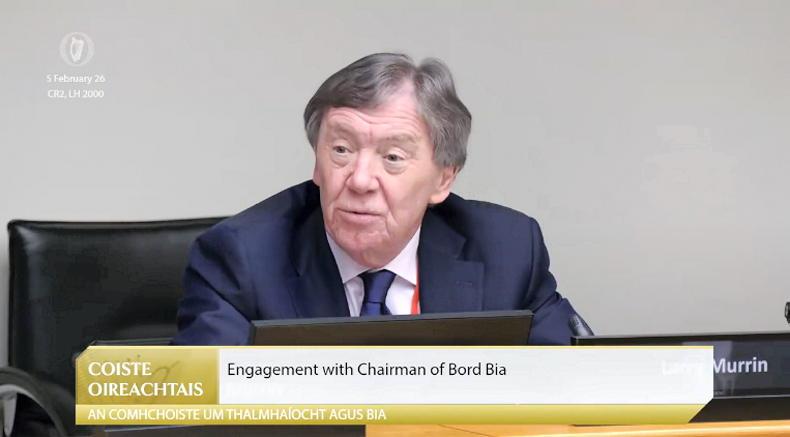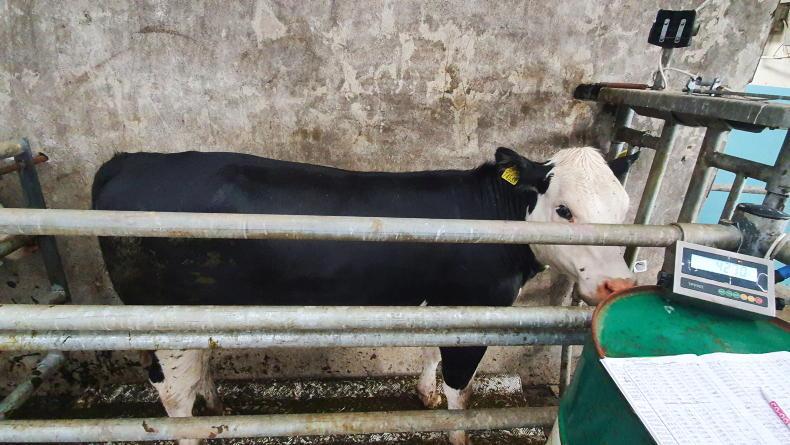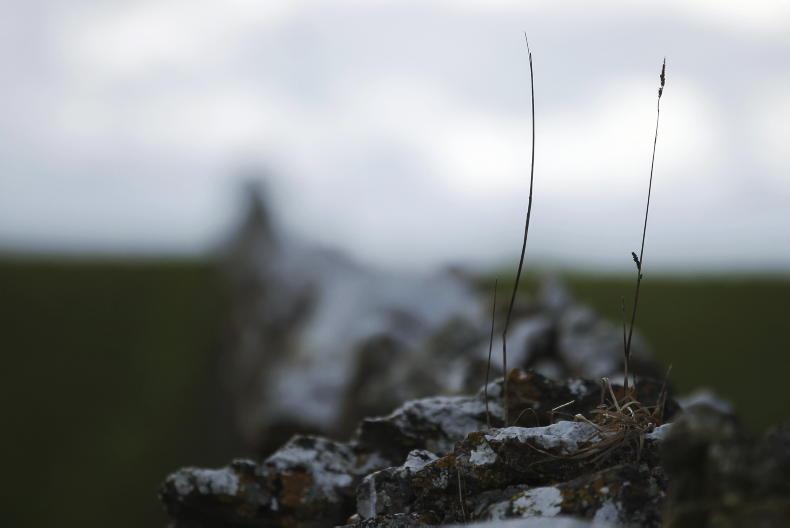Just back from a marathon meeting of the Council of Ministers in Brussels as Brexit and CAP changes loom, Minister for Agriculture Charlie McConalogue took time out to assess the challenges facing Irish agriculture.
On the EU and Brexit
Obviously, getting a deal and a free-trade agreement is very important for agri-food.
There is a significant issue relating to fisheries for myself and the other eight ministers affected by this issue [Brexit].
If we can get [a deal], it significantly changes the scenario. If there’s a no-deal, the implications are much starker – we’re into a tariff situation, which is the biggest issue.
We’re preparing in terms of having contingencies for the different scenarios here at Government level, but I’d be hopeful that we need the lesser of the contingencies.
For this reason, it’s appropriate that we see input both from agriculture, and from environment and indeed health, because it’s all interlinked. I think increasingly that is something that is widely understood. I think central to all that is that we have to keep a strong focus on farmers at all times. They are the key anchor of our food production system and the key custodians of our environment. Supporting them and supporting their incomes governs my approach to everything I do as minister.
I think central to all that is that we have to keep a strong focus on farmers at all times
On Joe Biden’s election
It’s a new departure, one that’s very positive for the Irish economy and for Irish agri-food as well. We’ve had the issue over the last year of the trade dispute between the US and Europe, over Boeing, which impacted a number of our food exports to the US. For instance, we’ve seen an increase of 25% in dairy products and Kerrygold butter. Our drinks exports as well.
[Biden’s presidency] can be a new departure that hopefully can lead to an unknotting of those particular challenges. In a wider view, we all have to work towards the implementation of the Paris climate accord, and it’s important that the heavyweights at world level are fully behind that.
It was really disappointing and disheartening to see the approach that president Trump had taken to that - it was really out of step. It’s really important to see president-elect Biden turning that table, because it’s much more productive if we’re working off a level playing field.
On TB eradication
I am very pleased to see the progress that I’ve been able to make, working with the farm organisations, in relation to getting unanimous agreement around the TB strategy. It was at a really low ebb when I took office. Relations were strained.
We all have to work towards the implementation of the Paris climate accord, and it’s important that the heavyweights at world level are fully behind that
The objective had been in terms of the establishment of the TB forum to try to get the policymakers to work together with farmers in a combined unified approach to tackle TB, to get reactor numbers down and work towards eradication in the years ahead.
We all put a lot of work in. I am really pleased that we have now published that strategy. The key thing now will be having it implemented, there’s a structure there in the TB forum.
The numbers have been going the wrong way in a very worrying way over the last year – we’ve seen the number of farms having reactors going from 3.5% to 4.5% in the last year, and that’s 12 or 13 extra farms a week going down.
It’s a bit of a mountain to climb in the short-term. I think it can only be climbed by everybody working together. It’s in everyone’s interests to work together to address this chronic issue, with the terrible stress and cost it brings to farmers.
On GLAS and “new REPS”
I announced in the budget that there would be a continuation of the GLAS scheme for those 36,000 farmers of the 48,000 whose contracts are ending. The pilot scheme which I’ll be introducing at the start of the year, following consultation, will be for those farmers who are not currently in an environmental scheme.
It’s very important to renew your [GLAS] scheme. If you decide not to take up the GLAS scheme extension, the new pilot scheme will not be available to you. It’s not an either/or.
The pilot scheme which I’ll be introducing at the start of the year, following consultation, will be for those farmers who are not currently in an environmental scheme
We’ve put a lot of effort into working with Minister [for Public Expenditure and Reform Michael McGrath] to get the funding to be able to continue GLAS. It’s on the basis that those who were in GLAS would be able to continue.
The additional fresh funding will contribute towards the pilot scheme for those who didn’t have the option of extending their GLAS. It will be aimed specifically at those who had come out of AEOS and who were excluded from GLAS and were unable to take it up, that’s a really important category, but also for others that aren’t currently in a GLAS scheme.
There will be other environmental measures in the year ahead too, funded from the €79m in new funding I got from the 2021 budget. That will be available to all farmers, those in GLAS, those in the new scheme and those that are not in any scheme.
We’re engaging in a consultation, because I want to get farmer input, their ideas on what a new environmental scheme should look like, the measures they think work. The measures we introduce have to deliver a real outcome and return in terms of meeting our environmental objectives, I want to do that in a way that best supports [farmers’] income.
On Veganuary and the image of Irish farming
I intend to be a very active participant in terms of defending the sector, of advocating for all the positive work that it does, and defending it against unfair and partisan representation. We have a tremendous food sector, our farmers do tremendous work, and as minister I want to advocate for Irish food, the health benefits of it, the way it is produced, and increasing the wider focus that is given to the Ag Climatise document.
Our farmers do tremendous work, and as minister I want to advocate for Irish food
It’s easy to run with fads, or to try and undermine what we have, but that must be fought back against and certainly I won’t be found wanting in that regard.
On maintaining the Northern Ireland Protocol in Brexit
It was really important. There was concern and uncertainty in recent weeks as a result of the Internal Markets bill being brought forward in the British parliament, that that might somehow undermine it. The Withdrawal Agreement of 2019, and the Irish Protocol in ensuring that we remain a one-island food nation and production system was really important, and also that we wouldn’t be seeing a hard border on the island in any aspect.
Although we’re waiting on the outcome of the wider Brexit deal, we can have some comfort, that’s really important to our agri-food sector.
On live exports
I’m very conscious of the importance of the live export trade, particularly in the context of spring calves and for the veal trade on the continent. It’s something I’ve been very proactive on, engaging with the live exporters association and the ferry companies to ensure those avenues are in place and that we’re prepared. The Spanish and Dutch markets are particularly important, and the omens seem good in relation to increasing demand there.
It took a hit this year due to COVID-19, but the early indications are that demand for next year will be reasonably good.
We’ve also seen the engagement with Teagasc in relation to a pilot flight to look at the potential and capacity of the option of flying young calves as a route to market.
The Spanish and Dutch markets are particularly important, and the omens seem good in relation to increasing demand there
I would say as well, we do have to look at how we integrate the dairy sector much better with the beef sector. In terms of the male calves from the dairy herd, we need to ensure we’re producing an animal that is worthwhile from a beef point of view. I want to look at how we further develop the potential of sexed semen.
On forestry
[It] has not been a good year at all in terms of licences. There’s a very significant backlog of licence applications. Farmers haven’t been well served in that regard. It will improve and it has to.
It has led to a chronic lack of supply in timber in recent weeks. I’m very conscious of that, as is Minister Hackett, and we’re working very closely together to get the system back on track.
The legislation passed in October streamlining of the licensing and appeals system is starting to show benefits. We’ve also increased staff numbers. This time last year we had two ecologists in the Department, now we have 16 with another 10 being hired. We also have extra forestry inspectors in place.
On rewetting of bogs
Farmers have a massive role to play in addressing climate change and biodiversity decline, but key to that is working in partnership. It’s not about being prescriptive in how farmers contribute, but incentivising and rewarding and improving farm incomes. That will be my approach in everything that we do. While we’re clear in where we need to go, the progress we’ve to make, I’m very flexible in terms of how we do that, and respecting farmers’ right to control their own destiny.









SHARING OPTIONS